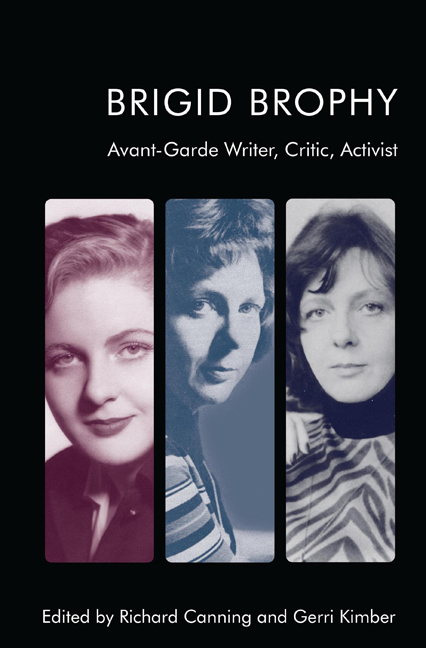Book contents
- Frontmatter
- Contents
- List of Illustrations
- Acknowledgements
- Introduction
- 1 Embodying the Fragments: A Refl ection on the Reluctant Auto-Biography of Brigid Brophy
- 2 Brigid Brophy’s Paradoxical World of Childhood
- 3 Intr oduction to ‘The Librarian and the Novel’
- 4 The Librarian and the Novel: A Writer’s View
- 5 Penetrating (the) Prancing Novelist
- 6 ‘Shavian that she was’
- 7 ‘Il faut que je vive’: Brigid Brophy and Animal Rights
- 8 Brigid Brophy’s Phenomenology of Sex in Flesh and The Snow Ball
- 9 Letter to Brigid
- 10 Encoding Love: Hidden Correspondence in the Fiction of Brigid Brophy and Iris Murdoch
- 11 ‘Heads and Boxes’: A Prop Art Exhibition Collaboration by Brigid Brophy and Maureen Duffy
- 12 Prancing Novelist and Black and White: Experiments in Biography
- 13 ‘Mo nster Cupid’: Brophy, Camp and The Snow Ball
- 14 ‘A Felicitous Day for Fish’
- 15 The Dissenting Feminist
- 16 A Certain Detachment?
- Notes on Contributors
- Index
1 - Embodying the Fragments: A Refl ection on the Reluctant Auto-Biography of Brigid Brophy
Published online by Cambridge University Press: 17 October 2020
- Frontmatter
- Contents
- List of Illustrations
- Acknowledgements
- Introduction
- 1 Embodying the Fragments: A Refl ection on the Reluctant Auto-Biography of Brigid Brophy
- 2 Brigid Brophy’s Paradoxical World of Childhood
- 3 Intr oduction to ‘The Librarian and the Novel’
- 4 The Librarian and the Novel: A Writer’s View
- 5 Penetrating (the) Prancing Novelist
- 6 ‘Shavian that she was’
- 7 ‘Il faut que je vive’: Brigid Brophy and Animal Rights
- 8 Brigid Brophy’s Phenomenology of Sex in Flesh and The Snow Ball
- 9 Letter to Brigid
- 10 Encoding Love: Hidden Correspondence in the Fiction of Brigid Brophy and Iris Murdoch
- 11 ‘Heads and Boxes’: A Prop Art Exhibition Collaboration by Brigid Brophy and Maureen Duffy
- 12 Prancing Novelist and Black and White: Experiments in Biography
- 13 ‘Mo nster Cupid’: Brophy, Camp and The Snow Ball
- 14 ‘A Felicitous Day for Fish’
- 15 The Dissenting Feminist
- 16 A Certain Detachment?
- Notes on Contributors
- Index
Summary
When talking about death, numbers matter immensely. Dates matter; the date illness was first recorded, dates marking the decline. The date of death. It will come around each year, reiterating the shock of death, whether it was expected or not. Age matters: ‘too young’ or ‘at least they had a good innings’. The time of death, that point at which our mattering is blown apart, is recorded, to keep hold of things, to make things ‘sensical’; this word, ironically, a backformation of its older antonym ‘nonsensical’. Language doesn't abide. It writhes against logic, through logic, creates its own. Language can describe death, but only from the outside. Numbers don't explain, but they delineate death, and they continue where we don’t.
I had my first encounter with the novelist, playwright, critic and campaigner Brigid Brophy, aged 19, in a book of collected texts celebrating women's fiction from every year of the twentieth century. The collection featured an extract from Brophy's 1956 novel, The King of a Rainy Country, and a short biography, stating that she had died in 1995, five years prior to the compilation's publication. It is not remarkable to find out that a writer, though new to you and surely a source of further wonder, is dead. But it is saddening to know they might still have been alive and writing should they not have been, as people say, ‘taken too soon’. Brigid Brophy died at only 66 years of age.
Excited by the extract, I bought a second-hand copy of The King of a Rainy Country on the internet, as it was out of print at that time. It has affected my life like no other novel, not only because of how I identified with the intangible school experience of the central character, Susan, as she falls in love with fellow pupil Cynthia, but because in Brophy's clear, yet ever-tantalising prose I detected a total revision of the concept of gender, deftly issued before such studies on the subject were established. For these reasons, I found myself astonished that it was out of print, angry at the howling omissions of writers such as Brophy from the predominantly white male canon of twentieth-century English literature, angry that writers like her were dismissed in her time as ‘oddities’ or merely ‘fashionable’, when in fact they were unashamedly progressive and ‘other’, thus writing to the experience of many.
- Type
- Chapter
- Information
- Brigid BrophyAvant-Garde Writer, Critic, Activist, pp. 10 - 19Publisher: Edinburgh University PressPrint publication year: 2020



